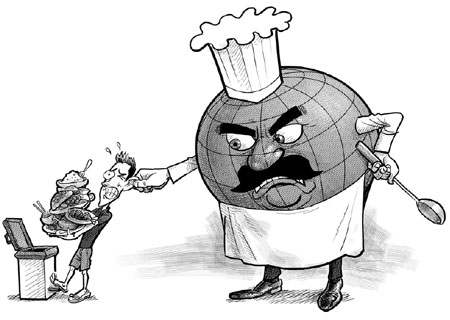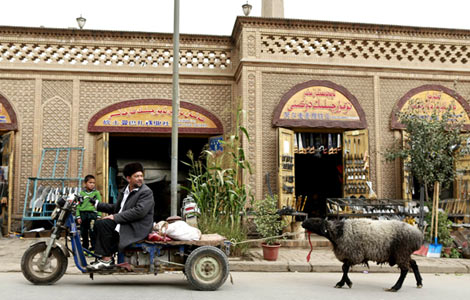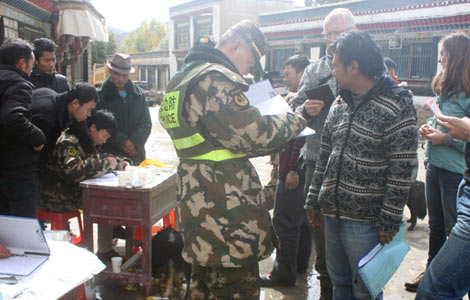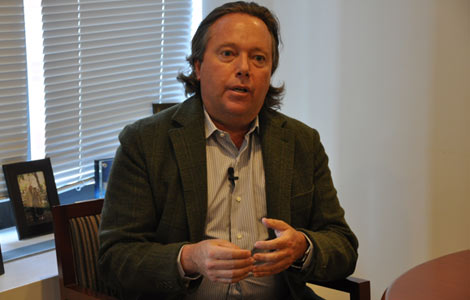Time to stop criminal wastage of food
Updated: 2013-10-16 07:25
By Jose Graziano da Silva and Achim Steiner (China Daily USA)
|
||||||||
One point three billion metric tons - that's how much food that we waste each year.
Not an easy number to wrap one's head around. Try to imagine 143,000 Eiffel Towers stacked one on top of the other-together they'd weigh around 1.3 billion tons. The sheer scale of the number makes it practically impossible to grasp, no matter how you come at it.
Rendering the figure all the more unfathomable is the fact that alongside this massive wastage of food, 840 million people experience chronic hunger on a daily basis. Many millions more suffer from "silent hunger" - malnutrition and micronutrient deficiencies.
For the more economically minded, here's another number: the economic cost of food wastage runs around $750 billion per annum. This is expressed in producer prices; if we were to consider retail prices and the wider impacts on the environment including climate change, the figure would be far higher.
In times of austerity, it's difficult to understand how a hemorrhage of money like this could go neglected. Yet it does. In fact, in some places, the volume of food wastage is rising.
Now a new report by the UN Food and Agriculture Organization, to be spotlighted at the Green Growth Forum this week in Copenhagen, has shed light on another troubling aspect of the problem: the negative consequences for the environment and the natural resources we rely on for our survival.
When food is lost or wasted, the energy, land and water resources that went into producing it are also squandered -while at the same time large amounts of greenhouse gases are released into the atmosphere during production, processing, and cooking.
We simply cannot tolerate the wastage of 1.3 billion tons of food per year-one-third of the world's annual food production. Not from an ethical or environmental perspective, not from an economic or development perspective, and certainly not from a food security perspective.
This is why seriously cutting down on food loss and waste is one of the five elements of UN Secretary General Ban Ki-moon's Zero Hunger Challenge and a major focus of the UN High Level Task Force on Global Food Security. We are working together within the UN system and with a broad coalition of other partners to rise to that challenge, that also calls for 100 percent access to adequate food all year round; to eliminate childhood stunting; to make all food systems sustainable; and to eradicate rural poverty.
There's a lot that can be done. To begin with, food losses and waste need to be seen as a cross-cutting policy issue, rather than a lifestyle choice to be left in the hands of individual consumers and their consciences. The world needs to wake up to the need for policies on food waste and losses that look at all stages of the food chain, from production to consumption.
Losses of food-on farms, during processing, transport and at markets-represent a thorn in the side of food security in most developing countries, where post-harvest losses can reach as high as 40 percent of production in some cases. Especially in these places, investment in infrastructure for transportation, storage, cooling and marketing of food is badly needed. Training farmers in best practices also has an important role to play.
In developed countries, food retailing practices require a rethink. For example, rejection of food products on the basis of aesthetic concerns is a major cause of food waste. Some supermarkets have already begun relaxing standards on fruit appearance, selling "misshaped" items at reduced prices and helping raise awareness that "ugly does not mean bad." More approaches like this, that find markets or uses for surplus food, are needed.
Both businesses and households should monitor to see where and how they waste food and take corrective steps, because prevention of waste is even more important than recycling or composting.
Unlike the mindboggling figure of 1.3 billion tons, these simple steps are easy enough to grasp-and within reach of each of us. The world has enough on its plate-food wastage is something we can all do something about now.
Jos Graziano da Silva is director-general of UN Food and Agriculture Organization, and Achim Steiner is executive director of the UN Environmental Programme. The two organizations are founding partners of the Think Eat Save - Reduce Your Foodprint campaign launched earlier this year.
|
Luo Jie / China Daily |
(China Daily USA 10/16/2013 page12)
Most Viewed
Editor's Picks
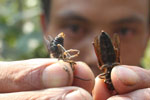
|

|

|

|

|

|
Today's Top News
Mexico demands US response over spying scandal
Breast cancer on the rise
Hong Kong, AmEx host culinary feast
Yao, NBA to open training school for teens
IMAX: China exceeds CEO's expectations
Last-ditch effort on debt ceiling
China-UK cooperation projects inked
Alcoa CEO to be feted by US-China Committee
US Weekly

|

|
